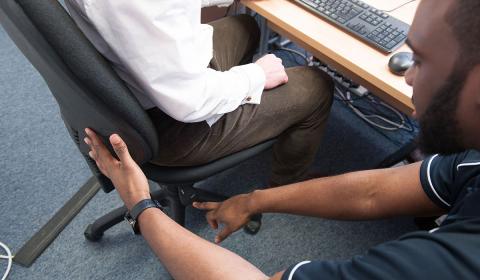Millions of people across the UK have physically demanding or repetitive jobs. If you’re one of them, this leaflet explains how to improve your health while doing your active or manual work and reduce your risk of injury

What we do to earn a living can have a positive impact on our physical and mental wellbeing. The idea that manual handling or repetitive movement is ‘bad for you’ is a myth.
But it is true that active work, if approached incorrectly, can sometimes contribute to health conditions like musculoskeletal disorders (MSDs) such as lower back pain, joint injuries muscular aches and strains and non-specific arm pain – which is a commonly used term for some types of pain felt in the fingers wrists, forearms, neck and shoulders.
Physical benefits
Active work has many physical benefits.
If your job involves a regular amount of activity like bending, lifting, stretching and pushing, the good news is that it affords you an excellent chance to take charge of your physical health. Frequent physical activity improves your overall health and fitness and will help you get the most from work and your life in general.
Just doing your job can help you meet the recommended target for exercise. Physiotherapists suggest you take 30 minutes of physical activity on at least five days each week. Exercise can be broken down to 10 or 15 minute chunks, if this suits you better.
Just make sure you:
- Warm up
- Use good technique
- Use any tools provided to help you do your job correctly.
- Rotate repetitive activities and remember to take your rest periods, or have ‘micro breaks’ regularly
- Consider seeking advice from a physio about specific exercises that will help you develop the strength you need to do your job safely and most effectively
- Adopt neutral work postures as much as possible
- Strengthen your muscles and improve your fitness so you can manage the demands of your job more easily.
- Follow your employer’s health and safety procedures
- Eat well and drink enough fluids
Mental benefits
Active employment can also benefit your mental wellbeing. Being physically active causes your body to release chemicals which help lift your mood and encourage you to feel more relaxed. These simple suggestions can help keep your stress levels in check
- Breathe properly.
- Look for the positives in and around your working environment. Get outside and enjoy some fresh air during breaks.
- Try to keep challenging situations in perspective.
- Make getting a good night’s sleep a priority.
- Use your holiday allowance to help you unwind and recharge.
Looking after yourself
There is much you can do to look after yourself in the course of your active work.
Physiotherapists recommend you think carefully about the movements your job requires you to carry out regularly. You should try to eliminate movements that are not benefiting your health and might be limiting your productivity.
Movements you should look to avoid include:
- Awkward or uncomfortable positions
- Using too much force
- Placing too much strain on one side of your body.
You can achieve this through developing better working postures. If you adopt the correct postures for the tasks you do at work and at home, your back, neck and other joints will remain healthy and strong, you’ll breathe freely, reduce your risk of developing problems and your internal organs will be able to work more efficiently.
Good posture
In a good posture, your spine, shoulder and hip joints will all be in correct alignment. You should aim to keep your feet hip distance apart and your arms close to your body. Viewed from the back, your spine would appear straight. From the side, it would have three natural curves, similar to the letter ‘S’.
Whether you are standing, sitting or leaning you should aim to avoid undue stress and strain on your joints. This will help you feel stronger and less tired.
Employer obligations
Your employer also has a legal obligation to provide safe and healthy workplaces for active workers. They should provide:
- Information and training about safe ways to work
- Risk assessments conducted by trained assessors to minimise hazards
- Changes to work environment and work style as far as is practical
- Safe equipment to assist you in your duties
- Encouragement for staff to take allocated breaks and leave work on time
Physios suggest employers consider basic ‘health promotion in the workplace’ tips. This might include advice or information about walk or cycle to work schemes and free or discounted access to exercise facilities.
Find out more
These Fit for Active Work posters and leaflets available in English and Welsh are designed to offer physiotherapy tips and advice to the millions of people across the UK with physically demanding or repetitive jobs.
You can also buy print copies of the leaflet in packs of 50 plus postage.
You can print your own copies using the PDF links below.






































